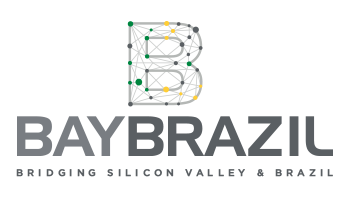Fabricio Bloisi turned Movile from a startup in a garage in Brazil into a leading global player in mobile marketplaces and content with more than 350 million customers worldwide. Its many businesses and brands include PlayKids, a leader in educational content for kids, and iFood, Latin America’s #1 food delivery service that’s raised nearly $600 million in funding. Movile’s long-time investors include Naspers and Innova Capital.
Fabricio is a featured speaker during a session at the annual BayBrazil conference on August 22 at SRI International in Menlo Park.
We sat down with him to get his point of view about creating a strong, innovative culture (a.k.a. the Movile Way), how Brazil compares with some of the other mature tech startup ecosystems around the globe, and what can be learned from that. He discusses some challenges he faced and overcame in building Movile into the powerhouse it is today.
There are still some tickets available to join us for BayBrazil’s 8th annual conference here.
BayBrazil: Despite Movile’s large size, instead of a more traditional corporate culture, you’re well known for a “Silicon Valley approach” a.k.a. the Movile way that seems to be paying off. For example, you sit at a cubicle with no walls, just like an intern or any other employee. Your open-door policy lets your employees walk up to you anytime to share their thoughts. What inspired you to take this approach and what are the business benefits?
Fabricio: Movile Group’s ecosystem provides a lot of knowledge exchange. The openness and dynamism that this ecosystem at Movile promotes among people means that there is a rich exchange of experiences, values, technical knowledge and a spirit of collaboration, because we believe that, together, we can reach our goal faster and better. That’s how we have systemic professionals who understand our business as a whole and contribute on our businesses to impact more and more lives. That’s our differentiator as a group and that’s what brings us the most profit.
BayBrazil: You studied at Stanford University’s Graduate School of Business, and have a Movile office in Silicon Valley. What fascinates you about Silicon Valley and how can Brazilian entrepreneurs learn and take away valuable ideas from this famous tech startup ecosystem?
Fabricio: When Movile and I located in Silicon Valley, we were looking for references and strategies for fast-growing companies. We could observe how companies think big, how growth happens on a day-to-day basis, how startups innovate, how they go global, how they make mistakes and how they correct them. We were alert 24/7, absorbing these insights, which we deployed in Movile during our growth phase. The Silicon Valley “boom” of startups gave us several ideas, but we also went further, looking for new hubs of innovation. This is why we are following China closely. We’re focused on studying the Chinese market in depth now because we see a great potential for mobile technologies, in a scenario that’s similar to ours in Latin America.
What I normally say to entrepreneurs, though, is how very important it is to always keep learning. Obviously, immersions in Silicon Valley or China are fundamental as references, but the learning curve needs to be kept alive amidst the day to day. I am constantly pushing myself to learn, pursuing new trainings and opportunities, and learning new things with people who are more advanced than us. So, my recommendation to Brazilian entrepreneurs is: keep learning!
BayBrazil: Recently, you told Forbes that Brazilians tend to “avoid the risk of trying something different because they feel they cannot fail, ever.” Will you share some challenges you faced in growing Movile from a small startup in a garage to a global juggernaut that’s expanded so rapidly around the planet across various sectors?
Fabricio: My main challenges were related exactly to the risk aversion. I have made several mistakes during my career, like when I discouraged our teams from failing. However, I’ve learned that if we don’t make mistakes, we’re not taking enough risks. We have to try, fail, adjust and try again. This is the only way we can learn and evolve fast. Today, I think my main mistakes have been related to not being very aggressive with goals in certain occasions, which led us to not evolve fast enough for some projects. There were several challenges and mistakes in our journey to create Movile, such as: losing money while insisting on doing too many projects, not being fast enough, and working on the wrong products. However, all these mistakes were fundamental for us to get where we are today. I hope to keep making mistakes in order to speed up our growth.
BayBrazil: How would you compare and contrast Brazil’s tech startup ecosystem today with other even more mature markets such as Berlin, London, Silicon Valley or Tel Aviv?
Fabricio: I believe we have huge potential as a country in Brazil, and that we can have many 10-billion- dollar companies. At Movile we work towards a goal of empowering businesses with global potential in order to expand the Brazilian ecosystem. Going global has ceased to be an option and it has turned into a necessity for us. Therefore, by targeting the domestic market alone and not planning out a strategy to impact lives globally, several Brazilian companies have been held hostage to their own limitations. There is a lot of big opportunities in Brazil and I believe many Brazilian tech companies will expand significantly in the years to come.
Hear more from Fabricio during our BayBrazil conference on Aug. 22 when he’ll sit down for a chat about “Unicorns made in Brazil” with Veronica Serra, founding partner of Innova Capital at 10am.








